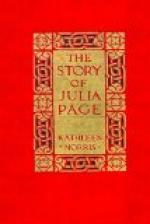“Oh, Mark,” said Julia fervently, “if you only would—I don’t mean that!” she interrupted herself, compunction seizing her at the look of mortal hurt on his face. “But I mean—if you only didn’t love me! You see, I’m perfectly happy, Mark, I’ve got what I want. And if Miss Toland takes me abroad with her next year, why, it’ll mean more to me than any marriage could, don’t you see that? You know what my childhood was, Mark; my mother didn’t love my father--” And as a sudden memory of the old life rose to confront her, Julia’s tone became firm; she felt a certain sureness. “Married people ought to love each other, Mark,” she said positively. “I know that. And I won’t—I never will marry a man I don’t love. If everything goes wrong, after that, you have only yourself to blame. And so many times it goes wrong, Mark! I should be unhappy, I should keep wondering if I wouldn’t be happier going my own way--wondering if I wouldn’t have—have gotten farther—do you understand me?”
This was a long speech for Julia, and during it Mark had twisted about, and pulled his hat over his face. Now, in a voice curiously dead and hard, he asked briefly:
“Gotten farther—where?”
“I don’t know,” said Julia candidly. “But the more I read, and the more I think, the more it seems to me that anyone can be anything in this world; there’s some queer rule that makes you rise if you want to rise, if only you don’t compromise! The reason so many people don’t ultimately get what they want is because they stop trying for it, and take something else!”
“And marriage with me would be a compromise, is that it?” Mark muttered sullenly.
“It would be for me,” Julia answered serenely. “Because staying where I am keeps me nearer what I want.”
“Money, huh?” asked Mark.
“Oh, money, no! Books and talk—things. And—and if I loved you, Mark, then don’t you see it would be the right thing to marry you?” she added brightly. “But now, it would only be because it was easier, or because I was tired of The Alexander, do you see?”
“I suppose so,” Mark answered drearily.
A long silence ensued. In silence they got off the car, and walked through the cheerless twilight of the dirty streets, and they were almost in sight of the settlement house before Mark burst out, a little huskily:
“Then there’s no chance for me at all, Julie?”
“Oh, Mark, I feel rotten about it!” said Julia frankly, her eyes full of pity and regret, and yet a curious relief evident in her voice. “I am so sorry! I’ve just been thinking of girls who like this sort of thing—I don’t see how they can! I am so sorry! But you won’t mind very long, Mark; you won’t always care; you’ll— why, there’s Doctor Studdiford’s automobile!”
For they were in sight of The Alexander now, and could see the electric runabout at the door. Motor cars were still new to San Francisco and to the world, and a crowd of curious children surrounded the machine.




